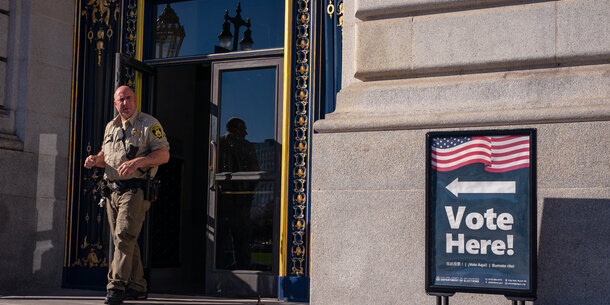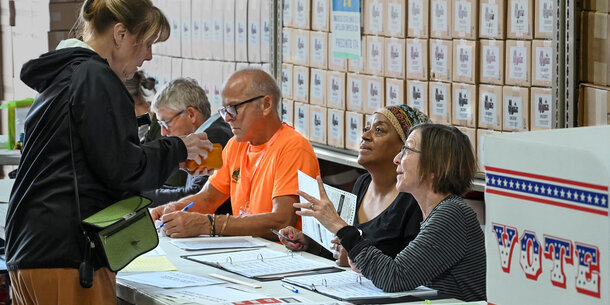On Friday, the company Cyber Ninjas released a report on its partisan review of the 2020 presidential election in Maricopa County, Arizona. As we’ve detailed previously, the Cyber Ninjas review failed to satisfy basic security, accuracy, and reliability measures, so the report can’t be trusted.
The authors of the Cyber Ninjas report appear to avoid outright lies that could get them sued, the way other perpetrators of the Big Lie have been. They allege no conspiracy to steal the election and find that Biden did, indeed, receive the most votes. But the incendiary and misleading innuendo that has marked this review from the start continues in the “report.”
To date, this farcical exercise has included a bamboo fiber hunt, spinning ballots, a Crazy Times Carnival, and multiple televised comedy segments. However, this effort, led by a rogue cluster of radical legislators, has cost Arizona taxpayers millions of dollars and counting. It has fueled a disinformation campaign that spurs death threats against trusted state and local election officials of both parties, and it was sufficiently outrageous to get the “official” audit account kicked off Twitter.
Not surprisingly, the report has the patina of substance, but that quickly fades if one bothers to read it. Titles and headings seem engineered for superspreaders of disinformation to use out of context.
For example, “More Ballots Returned by Voter Than Received” — turns out that even Cyber Ninjas assumes none of the extra ballots were double counted. Yes, some voters may have become anxious amidst Postal Service delays during the pandemic and decided to cancel their mail ballot and vote in person just in case — something Maricopa County handles with an electronic voter check in list that updates in real time. Others may have been contacted about a messy signature so that it could be corrected and the ballot counted, as Arizona law requires.
Or “In-Person Voters Who Had Moved out of Maricopa County” — turns out Cyber Ninjas used a commercial address verification service to guess whether and when a person may have moved, forcing them to concede that “error is expected within these results.” And Cyber Ninjas fails to distinguish between a temporary move and a permanent one. Going to college, temporarily moving to help family out as a caretaker during the pandemic — none of these things changes a voter’s eligibility to vote in the jurisdiction of their permanent residence.
As expected, state and local election officials, quickly and easily debunked the false claims made by several witnesses at Friday’s hearing called by Arizona Senate President Karen Fann, who, at minimum, has not been consistent about the taxpayer cost, purpose, or goals of this “audit.” Maricopa County Recorder Stephen Richer quickly debunked what Shiva Ayyadurai’s identified as a “smoking gun” in Ayyadurai’s rambling presentation about absentee ballot envelope signatures, tweeting “The ‘smoking gun’ affidavit envelope has a signature in the redacted phone number space. But we’ll ignore that.” And journalist Jen Fifield explained, “Do you know the reason why Shiva is confused about what processes the county used to process envelopes? Because the Senate did not ask for the written procedures in its subpoenas. It’s not that the county is withholding — it is that the Senate didn’t ask.”
The report makes a number of policy recommendations that sound sensible: “[E]lectronic voting machines must always have a paper backup of all ballots.” But many of them are already in place (and were in place before Cyber Ninjas came to town). Every county in Arizona uses hand-marked paper ballots, with ballot-marking devices that print a paper record used for accessibility by voters with certain disabilities. In fact, every “swing state” in the 2020 election used hand-marked paper ballots, touchscreen machines that print a paper record, or a mix.
Of course, all of us should be working to improve public confidence in our elections — the opposite of what Cyber Ninjas and their enablers have done over the last several months. There are things that would actually improve election security in Arizona, but we don’t see them in the Cyber Ninjas’ draft. We agree that Arizona legislators should improve the state’s hand-audit law, which they failed to do this session despite efforts by Arizona Secretary of State Katie Hobbs. Current law prohibits local election officials from conducting a postelection hand tabulation audit if the local political parties refuse to participate. The legislature shouldn’t authorize political gamesmanship in postelection audits, and it should consider effective and efficient risk-limiting audits. With our partners at R Street, in January we published a white paper detailing our postelection audit recommendations.
Election administration has become increasingly complex, even more so in massive jurisdictions such as Maricopa County, which is the second-largest election jurisdiction in the country. It’s not surprising that an obscure, small-time consulting firm, which reported only five employees in 2020 and has no actual elections experience, doesn’t know the ins and outs of how elections are run in Arizona in general or in Maricopa County in particular. What’s (still) surprising is that the Arizona Senate chose Cyber Ninjas to lead this sore loser effort to cast doubt on the 2020 election.
Millions of dollars have been raised in support of this nakedly partisan charade. All there is to show for it is a few alarmist titles that disinformation superspreaders could have written themselves.




